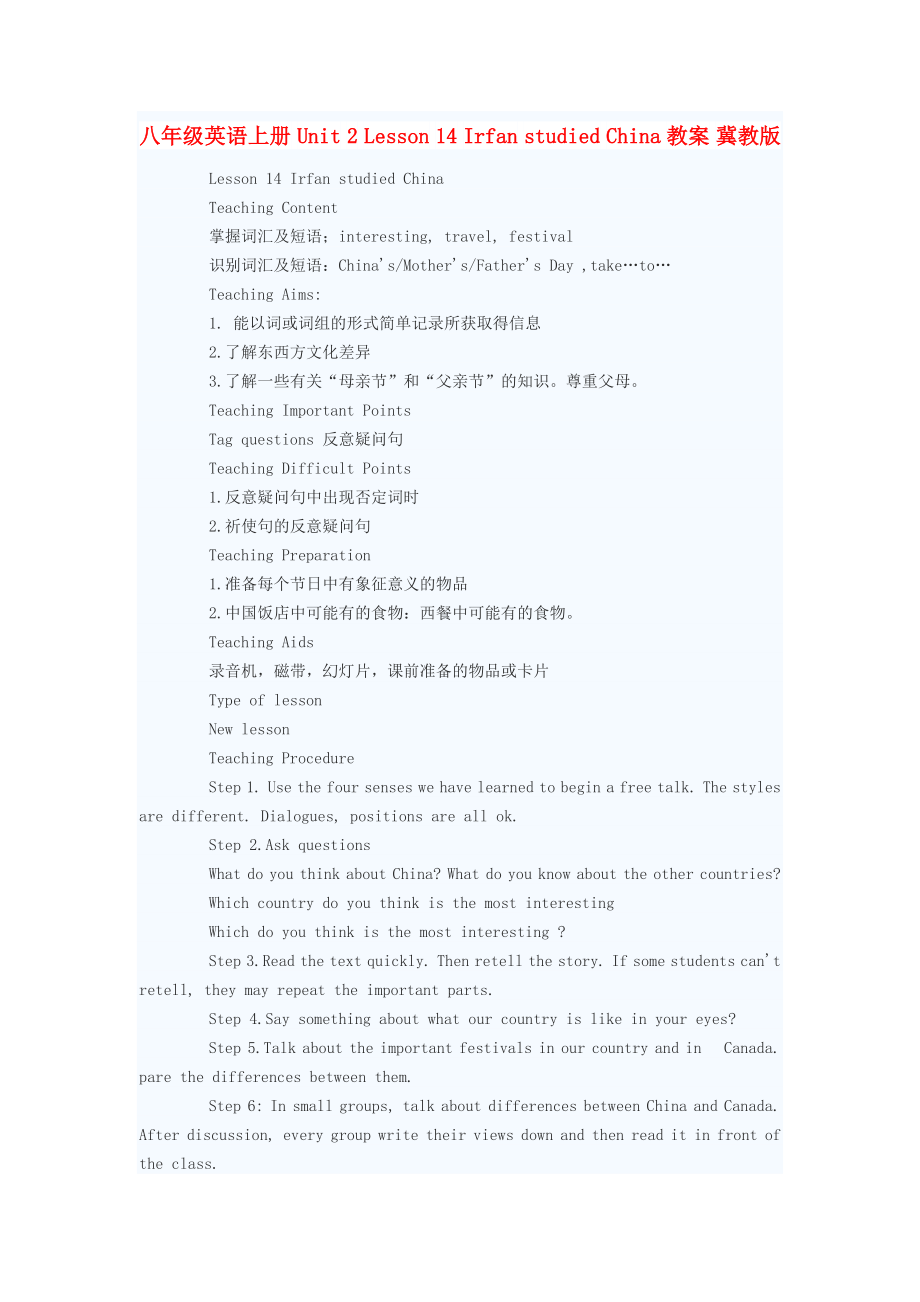《八年級(jí)英語(yǔ)上冊(cè) Unit 2 Lesson 14 Irfan studied China教案 冀教版》由會(huì)員分享����,可在線閱讀,更多相關(guān)《八年級(jí)英語(yǔ)上冊(cè) Unit 2 Lesson 14 Irfan studied China教案 冀教版(3頁(yè)珍藏版)》請(qǐng)?jiān)谘b配圖網(wǎng)上搜索�。
1、八年級(jí)英語(yǔ)上冊(cè) Unit 2 Lesson 14 Irfan studied China教案 冀教版
Lesson 14 Irfan studied China
Teaching Content
掌握詞匯及短語(yǔ);interesting, travel, festival
識(shí)別詞匯及短語(yǔ):China's/Mother's/Father's Day ,take…to…
Teaching Aims:
1. 能以詞或詞組的形式簡(jiǎn)單記錄所獲取得信息
2.了解東西方文化差異
3.了解一些有關(guān)“母親節(jié)”和“父親節(jié)”的知識(shí)�����。尊重父母����。
Teaching I
2、mportant Points
Tag questions 反意疑問(wèn)句
Teaching Difficult Points
1.反意疑問(wèn)句中出現(xiàn)否定詞時(shí)
2.祈使句的反意疑問(wèn)句
Teaching Preparation
1.準(zhǔn)備每個(gè)節(jié)日中有象征意義的物品
2.中國(guó)飯店中可能有的食物:西餐中可能有的食物�����。
Teaching Aids
錄音機(jī)����,磁帶,幻燈片�����,課前準(zhǔn)備的物品或卡片
Type of lesson
New lesson
Teaching Procedure
Step 1. Use the four senses
3�、 we have learned to begin a free talk. The styles are different. Dialogues, positions are all ok.
Step 2.Ask questions
What do you think about China? What do you know about the other countries?
Which country do you think is the most interesting
Which do you think is the most interesting
4�、?
Step 3.Read the text quickly. Then retell the story. If some students can't retell, they may repeat the important parts.
Step 4.Say something about what our country is like in your eyes?
Step 5.Talk about the important festivals in our country and in? Canada. pare the differences between
5、them.
Step 6: In small groups, talk about differences between China and Canada. After discussion, every group write their views down and then read it in front of the class.
Step 7: e to “LET'S DO IT
Step 8:Finish the activity book.
Summary
1.了解中西方文化背景�,有利于更好的學(xué)習(xí)英語(yǔ)。
2.注意”學(xué)困生“ 在小組中要發(fā)揮必
6、要的功能����。
內(nèi)容詳解
1. Which one is the most interesting? 哪一個(gè)是最有趣的?
The most interesting 是interesting 的最高級(jí)�, 三者或三者以上之間的比較用最高級(jí)。 形容詞的最高級(jí)的變化規(guī)則:
1)�����。 一般情況下比較級(jí)直接加-er, 最高級(jí)直接加-est.例如: long-longer---longest
2)�����。以不發(fā)音字母e 結(jié)尾的�����, 直接加-r, -st.例如:late-later--latest
3)����。 以重讀閉音節(jié)結(jié)尾的,雙寫最后一個(gè)輔音字母�����,再加-er, -est. 例如:big-
7、bigger -biggest
4)��。三個(gè)或三個(gè)以上音節(jié)的形容詞����, 加more 變比較級(jí),加most變最高級(jí)���。 例如:delicious-more delicious-most delicious
5)不規(guī)則形容詞的比較級(jí)和最高級(jí)
good/well-better-best? little-less-least? far-farther-farthest? much-more-most
2. You learn more about different countries of the world.你了解世界上不同的國(guó)家
1) learn ”學(xué)習(xí)�����,學(xué)會(huì)“.例如:l
8����、earn music 學(xué)音樂(lè)? learn English? 學(xué)英語(yǔ)
2) 與about, of連用��,表示”聽(tīng)說(shuō)����,了解到,得知“例如:
We learned about the news this morning.今天早上我才得知那個(gè)消息����。
3) learn后跟that 引導(dǎo)的賓語(yǔ)從句, 表示”獲悉����,得知“
We learned that he was in France.我獲悉他在法國(guó)。
4)���?!甭?tīng)到�,意識(shí)到“ 例如:
We are glad to learn that he teaches us English this term.聽(tīng)說(shuō)他本學(xué)期教我們英語(yǔ)
9、��,我們感到高興�。
5)。learn的過(guò)去式有兩種��,learned 或learnt,在美語(yǔ)中多用learned,在英語(yǔ)中多用learnt.
3. When we studied? China, our teacher took us to a Chinese restaurant and a Chinese grocery store. 當(dāng)我們研究中國(guó)的時(shí)候�����, 我們老師帶我們?nèi)チ艘粋€(gè)中國(guó)飯店和一個(gè)中國(guó)雜貨店�。
Took 是take的過(guò)去式?����!眛ake…to…“ 把某人帶到某地
Please take the box to the next room.請(qǐng)把這個(gè)箱子搬到隔壁的
10、屋子���。
His father always takes him to the park on Sunday.每逢星期天���,他的父親總是帶他去公園。
4.That's a funny name, isn't it?
這是一個(gè)反意疑問(wèn)句���。反意疑問(wèn)句的結(jié)構(gòu)不同于一般疑問(wèn)句和特殊疑問(wèn)句����, 它是由陳述句+反意疑問(wèn)詞構(gòu)成�。 反意疑問(wèn)詞部分由助動(dòng)詞+陳述部分主語(yǔ)的相應(yīng)代詞。如果陳述句是肯定式���,反意疑問(wèn)部分則用否定式����,陳述部分用否定式����,反意部分則用肯定式,即所謂”前否定���,后肯定�����;前肯定����,后否定“.反意疑問(wèn)部分通常譯為”是不是���,不是嗎“等����。例如:
It's sunny today, isn't it? 今天天氣晴朗��,不是嗎�?
He went to Beijing yesterday, didn't he? 他昨天去了北京,不是嗎��?
4. is called是被動(dòng)語(yǔ)態(tài)的結(jié)構(gòu)形式
被動(dòng)語(yǔ)態(tài)表示句子的主語(yǔ)和位于之間的一種動(dòng)賓關(guān)系��, 該句中用來(lái)強(qiáng)調(diào)it即”北京‘. 被動(dòng)語(yǔ)態(tài)的結(jié)構(gòu)是be+及物動(dòng)詞的過(guò)去分詞���。 例如:
Football is played all over the world. 全世界都踢球�。
His hair is cut every month.? 他每月理一次發(fā)。
 八年級(jí)英語(yǔ)上冊(cè) Unit 2 Lesson 14 Irfan studied China教案 冀教版
八年級(jí)英語(yǔ)上冊(cè) Unit 2 Lesson 14 Irfan studied China教案 冀教版

